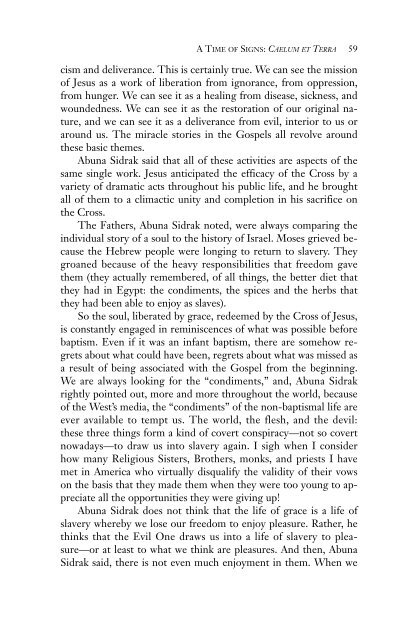Journey Back to Eden.pdf - St Mark Coptic Orthodox Church Chicago
Journey Back to Eden.pdf - St Mark Coptic Orthodox Church Chicago
Journey Back to Eden.pdf - St Mark Coptic Orthodox Church Chicago
Create successful ePaper yourself
Turn your PDF publications into a flip-book with our unique Google optimized e-Paper software.
A TIME OF SIGNS: CAELUM ET TERRA 59cism and deliverance. This is certainly true. We can see the missionof Jesus as a work of liberation from ignorance, from oppression,from hunger. We can see it as a healing from disease, sickness, andwoundedness. We can see it as the res<strong>to</strong>ration of our original nature,and we can see it as a deliverance from evil, interior <strong>to</strong> us oraround us. The miracle s<strong>to</strong>ries in the Gospels all revolve aroundthese basic themes.Abuna Sidrak said that all of these activities are aspects of thesame single work. Jesus anticipated the efficacy of the Cross by avariety of dramatic acts throughout his public life, and he broughtall of them <strong>to</strong> a climactic unity and completion in his sacrifice onthe Cross.The Fathers, Abuna Sidrak noted, were always comparing theindividual s<strong>to</strong>ry of a soul <strong>to</strong> the his<strong>to</strong>ry of Israel. Moses grieved becausethe Hebrew people were longing <strong>to</strong> return <strong>to</strong> slavery. Theygroaned because of the heavy responsibilities that freedom gavethem (they actually remembered, of all things, the better diet thatthey had in Egypt: the condiments, the spices and the herbs thatthey had been able <strong>to</strong> enjoy as slaves).So the soul, liberated by grace, redeemed by the Cross of Jesus,is constantly engaged in reminiscences of what was possible beforebaptism. Even if it was an infant baptism, there are somehow regretsabout what could have been, regrets about what was missed asa result of being associated with the Gospel from the beginning.We are always looking for the “condiments,” and, Abuna Sidrakrightly pointed out, more and more throughout the world, becauseof the West’s media, the “condiments” of the non-baptismal life areever available <strong>to</strong> tempt us. The world, the flesh, and the devil:these three things form a kind of covert conspiracy—not so covertnowadays—<strong>to</strong> draw us in<strong>to</strong> slavery again. I sigh when I considerhow many Religious Sisters, Brothers, monks, and priests I havemet in America who virtually disqualify the validity of their vowson the basis that they made them when they were <strong>to</strong>o young <strong>to</strong> appreciateall the opportunities they were giving up!Abuna Sidrak does not think that the life of grace is a life ofslavery whereby we lose our freedom <strong>to</strong> enjoy pleasure. Rather, hethinks that the Evil One draws us in<strong>to</strong> a life of slavery <strong>to</strong> pleasure—orat least <strong>to</strong> what we think are pleasures. And then, AbunaSidrak said, there is not even much enjoyment in them. When we


